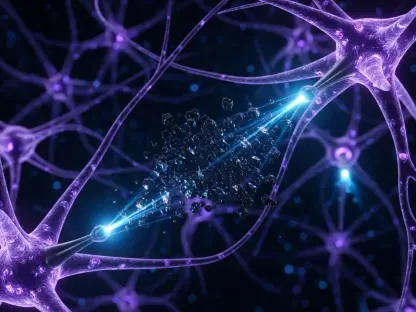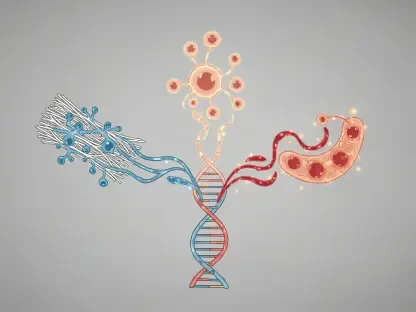Respiratory Syncytial Virus (RSV) is a common virus that infects nearly all children by the age of two, but while most cases are mild, some children experience severe respiratory illness that requires hospitalization. The mechanisms behind this severity, especially the role and dysfunction of natural killer (NK) cells, are key to understanding the pathogenesis of severe RSV infections. This investigation, spearheaded by Melody Duvall, a pediatric critical care physician at Boston Children’s Hospital, delves into why some children suffer disproportionately when infected with RSV.
The Role of NK Cells in the Immune System
Natural killer (NK) cells play a crucial role as early responders in the immune system, tasked with dual functions: producing cytokines to signal infection and executing cytotoxicity to eliminate infected cells. These critical activities are essential for controlling viral infections, including RSV. In healthy individuals, NK cells circulate in the blood and are poised to respond rapidly to infections. When an infection such as RSV targets the lungs, NK cells migrate to these sites to perform their defensive roles. However, this process appears disrupted in severe cases of RSV.
During severe RSV infections in children, NK cells undergo significant changes that affect their functionality. Normally, NK cells are highly effective at killing infected cells and producing signaling molecules to help coordinate the immune response. However, in the face of severe RSV, these capabilities are altered. The efficiency of NK cells in targeting and destroying infected cells diminishes, leading to challenges in controlling the virus’s spread and associated symptoms.
Decrease of NK Cells in Blood During Severe RSV
In a pivotal finding from Melody Duvall’s study at Boston Children’s Hospital, a marked decrease of NK cells in the blood of severely infected children was observed. This finding was stark when compared to levels found in healthy controls, suggesting a redistribution of NK cells during severe RSV infections. Blood samples from 37 patients in intensive care revealed an alarming reduction in NK cell count. This observation leads to speculation that NK cells are being recruited to the lungs, the main site of infection, thus depleting their presence in the bloodstream.
The implications of this redistribution are significant. With fewer NK cells in the blood, the overall immune response becomes compromised, potentially allowing the virus to propagate more freely. This severe depletion of NK cells in the bloodstream could be a critical factor in the severe disease’s progression, as it hampers the body’s ability to fight off the infection effectively.
Impaired Function of NK Cells in Severe RSV Cases
The study delved deeper into the functionality of NK cells in children severely affected by RSV. Findings revealed that NK cells extracted from these patients displayed impaired cytotoxic properties. In controlled experimental setups, patient-derived NK cells were mixed with target cells, and their efficacy in attacking and killing these targets was significantly reduced. This evidence points towards an immune dysfunction where NK cells are less capable of performing their essential role in eliminating infected cells.
Further discoveries through advanced techniques such as confocal microscopy highlighted a disruption in the “kiss of death” process. This process involves the cytoskeletal reorganization in NK cells, allowing toxic granules to infiltrate and kill infected cells. In NK cells from children with severe RSV, this cytoskeletal reorganization was impaired, leading to a reduced ability to deliver the lethal payload to infected cells. This impairment provides a concrete explanation for the observed dysfunction, underscoring the NK cells’ compromised state during severe infections.
Redistribution of NK Cells to the Lungs
The study also noted a considerable increase in NK cells within the airways of children suffering from severe RSV, compared to those uninfected or with mild cases. This increase suggests a strategic immune response where NK cells are recruited to the lungs, the virus’s primary site of attack. However, this beneficial redistribution results in their reduced presence in the bloodstream, potentially compromising the body’s overall immune response.
While the recruitment of NK cells to the lungs aims to combat the virus more effectively, it simultaneously causes a depletion elsewhere in the body. This shift in distribution might be an immune system’s desperate attempt to control the infection at its core site, but in doing so, it leaves other body regions less defended, possibly exacerbating the overall severity of the disease.
Shift in NK Cell Function During Severe RSV
Another critical finding of the study was the shift in NK cell roles during severe RSV infections. Instead of performing their primary role of cytotoxicity, NK cells in severely infected children seemed to produce more cytokines. Cytokines are signaling molecules involved in the immune response, but an overproduction can lead to excessive inflammation, particularly damaging in the lungs.
This shift might explain the extreme lung inflammation observed in these patients. Excessive cytokine production can exacerbate the immune response, leading to a condition known as a cytokine storm. This overactive response can cause more harm than good, as the heightened inflammation can damage lung tissue, contributing to the severe respiratory symptoms and potential complications observed in these children.
Challenges in Studying NK Cells in Critically Ill Children
Studying NK cells in critically ill children poses significant challenges, especially since obtaining direct airway samples can be complicated by advanced respiratory support interventions such as ventilators. Despite these hurdles, the research team managed to collect valuable data, acquiring airway samples from 10 patients and blood samples from 37 patients admitted to intensive care.
Comparative analysis between these samples yielded critical insights into the behavior and function of NK cells during severe RSV cases. These findings highlight the complexity of immune responses in critically ill pediatric patients and emphasize the intricate dynamics within the immune system when battling severe viral infections like RSV.
Future Research and Therapeutic Implications
Respiratory Syncytial Virus (RSV) is a widespread virus that infects almost every child by the age of two. While most cases are relatively mild and resemble a common cold, certain children endure severe respiratory issues that necessitate hospitalization. The factors contributing to the severity of these cases are complex, particularly the involvement and malfunction of natural killer (NK) cells. Understanding these mechanisms is vital for grasping how severe RSV infections develop. Leading this exploration is Melody Duvall, a pediatric critical care physician at Boston Children’s Hospital. Her research aims to uncover why some children are hit harder when they contract RSV, focusing on the role that NK cells play in the disease’s progression. By studying these elements, the goal is to develop better strategies to treat and hopefully prevent severe RSV infections in vulnerable children. This research is crucial as it could lead to improved clinical outcomes and potentially save many young lives, providing a clearer picture of RSV’s pathogenesis and the body’s response to it.









